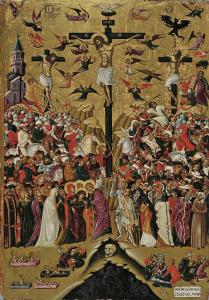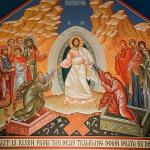
The cross. It had come to this. It was always coming to this, ever since he was born. The God-man, Jesus Christ, experienced murderous hatred toward himself all his life (as can be seen by the way Herod wanted the infant Jesus killed). And yet, with all that hate, he came to the world to reveal God’s love, a love which transcended such hate, because it was a love which would not allow itself to be anything but love. Jesus loved the world, and all those in it, even if those in it, especially those bound by the systemic and systematic structures of sin, sought to snuff him out. He went to those who, like himself, the world hated and wanted to be destroyed, those the world were willing to sacrifice so that those in positions of power and luxury, or those who desired such positions, could retain or attain such power, the power granted by them by sin and death. He first showed the world, even his enemies, his love, when he pleaded for sinners to change their ways, to embrace love, and be healed in mind, body, and soul. His final act on the world stage, the final act of his temporal ministry, was to show that love by his death on the cross.
Those who were discouraged in life, those who were abused and neglected by society, were those who were those most likely to be ready for Jesus’ message of love. Obviously, not all of the dispossessed heeded Jesus’ words, as some, like today, wanted to join in with those who had power and affluence and be just like them: that is, they did not have any problem with the system in place, they just didn’t like their place in it. Similarly, there were some who had positions of authority who were not so caught up by the structures of sin, who fought against them, and so opened themselves to Christ and his message of love. Nonetheless, it is clear, Jesus’ message challenged society, and so became a source of strife as it exposed the powers that be for what they were, showing the world that their power was merely the power given to them by sin and death. This is why, from the time of his birth, Christ knew there would one day be a final confrontation between the powers that be with himself, that is, a confrontation between love with hate, life with death.
Jesus followed the way of life, the way of love. He would only do what love would have him to do, which is help those who were willing to be helped, and offer himself as a sacrifice to the powers that be so that their hatred could be and would be satisfied. He did not let hate overcome his love – even in death, he confronted hate with love, until at last, hate could do no more with him, showing that love reigned supreme. While God’s love for all creation was revealed by all that he had done in his temporal ministry, it was especially revealed on the cross, in the way Jesus let himself be taken in and executed by the powers that be. He showed everyone that his love would not be overcome, so that as St. Photius the Great said, even in the tomb, Jesus’s mission of love continued. He did not become bitter and resentful of what had been done to him and use it to change his plan and destroy that which he came to save:
The Lord is covered with a tomb, but the Lord’s providence for all things is not shut in with it, nor does He make the sin of His insulters an occasion for universal destruction. Nay, the Creator dwells in a tomb, yet steers the universe in a goodly order. For it was not to wreck disaster that He willingly endured the cross, death, blows, spitting, and every torment, but in order to deliver humankind from it. [1]
Jesus willingly took on all the suffering, all the grief, all the evil which sin could and would do to him. He suffered, as all those who suffer such harsh treatment suffer, but he was not changed by it. In his death, he came to the tomb as he was in life, full of love. The fallen world showed him what it wanted of him and his ways: it wanted to break him, to make him act in accord to the way it worked, to prove himself by power and might instead of by self-sacrificial love:
So also the chief priests, with the scribes and elders, mocked him, saying, “He saved others; he cannot save himself. He is the King of Israel; let him come down now from the cross, and we will believe in him. He trusts in God; let God deliver him now, if he desires him; for he said, `I am the Son of God.'” And the robbers who were crucified with him also reviled him in the same way. (Matt. 27: 41-44 RSV).
He could have had legions of angels come and reveal their might, freeing him from the cross and taking on those who wanted to destroy him. He could have done that without their aid. But neither of those things were what he wanted to do. He came into the world to show God’s love, to reveal the way of love, to show that such love is greater than the power of sin. Sin and death can only do so much to a given person before its power is exhausted. It can lead to the death of the body, but it does not have to lead to the death of the soul – it will do so only if we give in to its ways.
Jesus showed the power of love is greater that sin because if it is embraced to the end, it will be victorious against hate, as hate is self-destructive and leads to its own demise while love flourishes and has no natural end. Thus, on the cross, we see the Lord of Life, the Lover of Humanity, indeed, the Lover of Creation come face to face with the structures of sin and hate; he let hate do all it wanted, and in doing so, he was killed, but the love inside was not. That love remained victorious, even if on the day he died, it appeared to have been entirely snuffed out.
[1] St. Photius, The Homilies of Photius, Patriarch of Constantinople. Trans. Cyril Mango (Harvard: Harvard University Press, 1958; repr. Eugene, OR: Wipf & Stock, 2017), 195 [Homily XI].
Stay in touch! Like A Little Bit of Nothing on Facebook.
If you liked what you read, please consider sharing it with your friends and family!
N.B.: While I read comments to moderate them, I rarely respond to them. If I don’t respond to your comment directly, don’t assume I am unthankful for it. I appreciate it. But I want readers to feel free to ask questions, and hopefully, dialogue with each other. I have shared what I wanted to say, though some responses will get a brief reply by me, or, if I find it interesting and something I can engage fully, as the foundation for another post. I have had many posts inspired or improved upon thanks to my readers.












